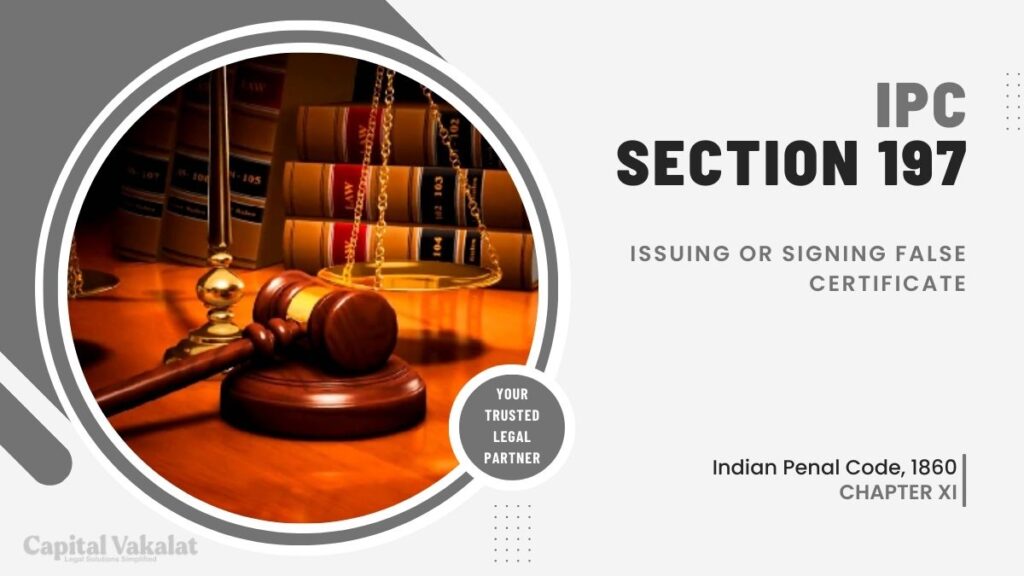False certificates can wreak havoc on the credibility of documents, individuals, and organizations. Section 197 of the Indian Penal Code (IPC) addresses this grave issue, setting the stage for understanding the legal implications and consequences of issuing or signing false certificates.

Understanding Section 197 IPC
What is Section 197 IPC?
Section 197 IPC is a critical legal provision in India that deals with offenses related to the issuance or signing of false certificates. It is essential for maintaining the sanctity of documents, ensuring trust in authorities, and upholding the law.
Purpose of Section 197 IPC
The primary purpose of Section 197 IPC is to protect the integrity of certificates, such as educational, medical, or character certificates, which play a pivotal role in various aspects of life. It discourages individuals from forging or falsifying such documents.
Significance in Legal Proceedings
Section 197 IPC is highly significant in legal proceedings. It sets the standards for proving the offense and determining the penalties for those found guilty. It is a potent tool in the hands of the law to maintain justice and fairness.
Elements of Issuing or Signing False Certificate
Defining False Certificates
False certificates encompass a wide range of documents that have been forged or falsified. This can include academic degrees, medical reports, character certificates, and more. Any document that is intentionally misrepresented falls under this category.
Different Forms of False Certificates
False certificates can take various forms, such as counterfeit diplomas, fraudulent medical records, or fake character certificates. These fraudulent documents can be used for personal gain or to deceive others.
Who Can Be Accused?
Individuals who issue or sign false certificates can be accused under Section 197 IPC. This includes not only the perpetrators but also those who aid or abet the act. Even authorities who fail to take appropriate action against such offenses can be held accountable.
Legal Consequences
Section 197 IPC outlines strict legal consequences for those found guilty of issuing or signing false certificates. Penalties can range from fines to imprisonment, depending on the severity of the offense and the impact it has on society.
Legal Implications
Importance in Maintaining Credibility
Maintaining the credibility of certificates is of utmost importance. False certificates erode trust, making it difficult for institutions, employers, and individuals to rely on these documents for accurate information.
The Role of Authorities
Authorities play a vital role in upholding the provisions of Section 197 IPC. It is their duty to investigate cases of false certificates thoroughly and ensure that the perpetrators face legal consequences. This is essential to deter others from engaging in similar fraudulent activities.
Proving the Offense
Proving the offense of issuing or signing false certificates can be challenging. It requires concrete evidence and a thorough investigation. The legal system must ensure that due process is followed while prosecuting the accused.
Punishments and Penalties
The severity of punishments and penalties under Section 197 IPC varies based on the impact of the offense. Those found guilty may face fines, imprisonment, or both, to ensure justice is served and that they understand the gravity of their actions.
Real-World Cases
Notable Cases Involving Section 197 IPC
Several high-profile cases have highlighted the importance of Section 197 IPC. These cases have not only exposed the culprits but also served as a warning to others contemplating the issuance or signing of false certificates.
Impact on Society
The impact of false certificates on society is far-reaching. It undermines trust, tarnishes reputations, and affects the lives of innocent individuals. Society as a whole suffers from such fraudulent activities.
Preventing False Certificates
Preventing the issuance of false certificates requires a multi-pronged approach, including stricter verification processes and increased vigilance. Educational institutions, healthcare providers, and employers must work together to combat this issue.
Raising Awareness
Raising awareness about the consequences of issuing or signing false certificates is crucial. Educational campaigns and information dissemination can help potential offenders understand the legal repercussions and deter them from committing the offense.
Legal Reforms
The legal system should continuously evolve to address the challenges posed by false certificates. Reforms can streamline the legal process, making it more efficient in dealing with such cases.
In conclusion, Section 197 IPC plays a vital role in upholding the integrity of certificates and documents. It is a legal safeguard against the issuance or signing of false certificates, ensuring that those who engage in such activities face appropriate legal consequences.
Frequently Asked Questions
Who can be accused under Section 197 IPC?
Individuals who issue or sign false certificates, as well as those who aid or abet the act, can be accused. Even authorities who fail to take appropriate action against such offenses can be held accountable.
What are the legal consequences of issuing or signing false certificates?
The legal consequences can range from fines to imprisonment, depending on the severity of the offense and its impact on society.
Why is raising awareness about false certificates important?
Raising awareness is essential to deter potential offenders by helping them understand the legal repercussions and the negative impact of false certificates on society.
What can be done to prevent the issuance of false certificates?
Preventing false certificates requires stricter verification processes, increased vigilance, and collaboration among educational institutions, healthcare providers, and employers.